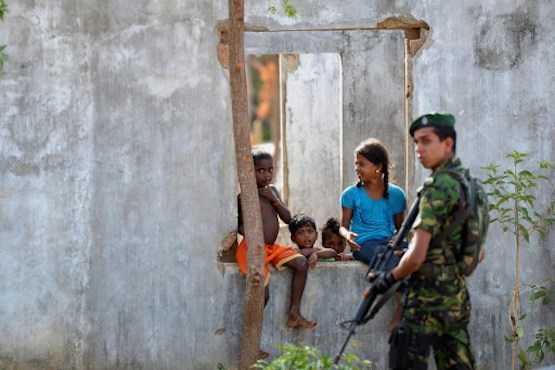
Sri Lankan children look on as a soldier stands alert at a resettlement village on the Jaffna Peninsula on Sept. 2, 2016. (Photo by AFP)
Tamils living in northern and eastern Sri Lanka are struggling to move on with their lives amidst social adversity but government efforts to promote reconciliation has instilled a sense of hope for the New Year.
"I think 2017 will be a better year," said Father Pathinathan Josephdas Jebaratnam, vicar general of Jaffna Diocese. While Tamils in the north and east continue to live in camps, there are hopes people will soon be able to move onto land released by the government.
Father Jebaratnam also points to the greater freedom to honor the war dead for Tamils. Even in Jaffna, people were allowed to commemorate their loved ones, unlike the previous year when "people weren’t allowed to visit and pay homage to militants buried there," he said.
The situation though remains tense. On Oct. 21 two senior students from Jaffna University, Sundiraja Sulakshan of Kandarodai and Nadarasa Gajan of Kilinochchi, were shot and killed by police for failing to stop on their motorbike when ordered.
Father Jebaratnam had fears for the social fabric of the university. However, at a university carol service there was a strong sense of harmony between Tamil and Sinhala students, he said. "The sort of fears I had, I did not see. On the contrary, people were united," he explained.
The chair of the diocesan Commission for Justice and Peace, Father Santhiapillai Mangalarajah, told ucanews.com that the army had already destroyed everything and that not a single cemetery was remaining. "People are not happy," he said.
He noted that people lit candles but due to the presence of the army’s secret service, there is no monument and the only service for the dead Tamil militants was in Mulliwaikkal. "What’s wrong in remembering them? Why can’t the people remember the dead?" he asked.
He also observed that former president Mahinda Rajapaksa, now a member of parliament, was spreading talk that Tamils were taking up arms again. A claim he flatly denies.
Father Mangalarajah explained that people were no longer living in the eight or nine existing camps but that most people were living with relatives.
"People who are in the camps want to be resettled in their own places but the government says that they will give them alternative places," he said.
In the Myliddy harbor area there are about 2,000 families who are responsible for catching fish and another 2,000 more dependent on the fishing community — both groups are waiting to return to their homes.
"They just want the land released but instead the army has built a number of circuit bungalows and golf courses, destroying houses and even two churches in the process," Father Mangalarajah said.
Trincomalee bishop, Noel Emmanuel, said in an interview with ucanews.com that the situation is "improving, but a lot of things need to be done since people are not totally free or happy."
"We have had a lot of struggles in relation to religious harmony. Due to the certain actions of Buddhist monks, there was unrest in the community. So nobody was able to do anything, not even the authorities," Bishop Emmanuel said.
Another issue faced by Tamils in eastern Sri Lanka is the growing concern around Muslim dominated provincial councils. As a result administrative decisions continue to favor the Islamic community, making it easier for them to secure jobs in state institutions, Bishop Emmanuel noted.
Commenting on the government allowing the people to commemorate the dead, Bishop Emmanuel said, "I was really surprised because it was a huge change and people were able to pay their respects to their loves ones, whether they were LTTE cadres or not."
"We can’t expect a whole change — in future they might allow Tamils to maintain such cemeteries — that is possible," he said.
Jehan Perera, Executive Director of the National Peace Council and a human rights activist, said, "Much needs to be done, like returning land to the people and reducing the military presence in the North."
However Perera remains optimistic. "Overall life has improved tremendously from what it used to be and it is continuing to improve," he said.
Bishop Kingsley Swamipillai of Mannar said people want to know what the solution to the Tamil problem will be. "They are asking for equal rights in a single state or some form of federalism."
He believes that federalism would be better as more political power would be devolved but noted that if this wasn’t possible, they would have to fall back on pressing for equality. The people "are discussing and meeting" on this issue and "some are only for one or the other," the bishop said.


